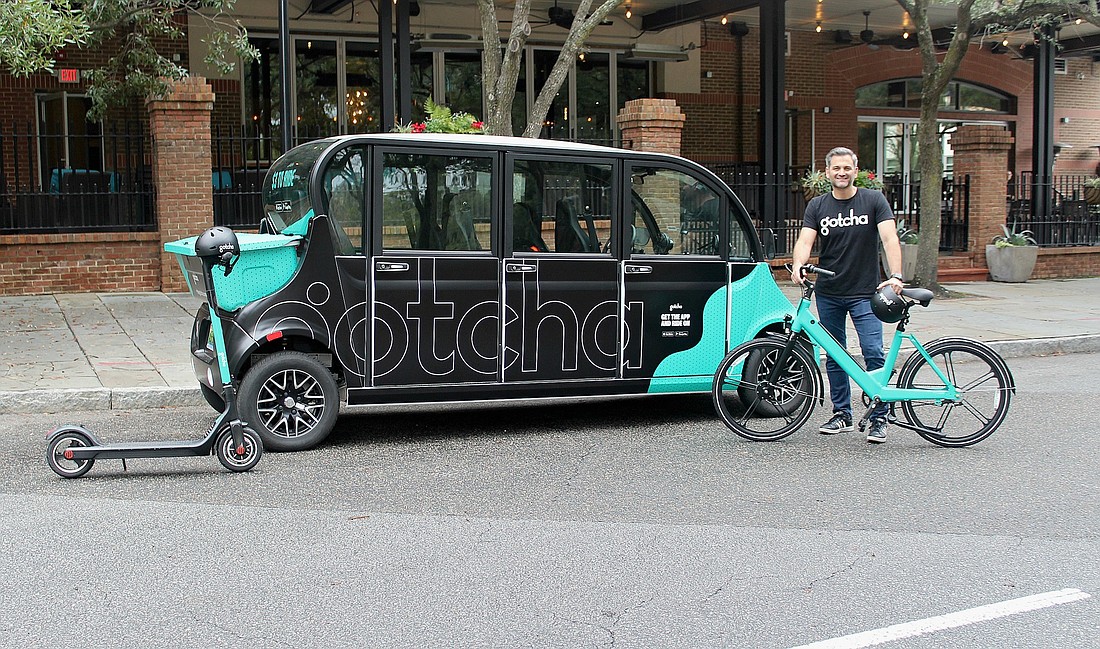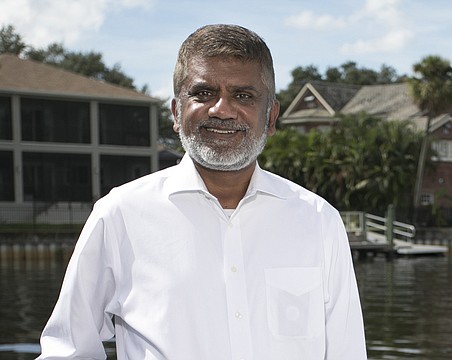It’s not planes, trains and automobiles — it’s electric vehicles, bikes and scooters.
That's the model at Charleston, S.C.-based Gotcha. The company provides micro-transit options to people in 50 cities and university campuses nationwide. It's niche is in operating electric vehicle, bike and scooter share services in areas where riders take a trip from one side of downtown to another or from one part of campus to another.
Gotcha, billing itself a “mobility-as-a-service” company, began almost 10 years ago. Its vehicle ride share is now in Sarasota, and founder and CEO Sean Flood has big plans for the company’s expansion statewide.
On a recent trip to Sarasota, Flood shared his thoughts on how the service works, how he tracks success and growth opportunities. Edited excerpts:
- Garnet and gold: Florida State University was Gotcha’s first university partnership, almost 10 years ago, says Flood, an FSU alum. The company now has some 3,500 vehicles, scooters and bikes dispersed among its markets. Flood anticipates the number of ride options growing exponentially in 2019, to 18,000 to 20,000.
- It’s a wrap: The company initially introduced an i-Ride ride share in Sarasota, and the business model was based on advertising displayed on vehicles along with subsidies it received for 18 months from the city. In the first year, Flood says the service provided 50,000 rides. There was no cost to riders to use the service other than the ability to tip drivers. When the company returned to town with the recently launched Gotcha vehicle share, it decided to convert to a pay-per-trip model in Sarasota. “From a user perspective I think there is some confusion,” Flood says of vehicles with advertising. When some people see a branded vehicle go by, they don’t realize it’s a mode of transport, he adds.
“In a perfect world, a lot of markets are good for all three of them.” — Sean Flood, founder and CEO, Gotcha
- Mode mentality: Gotcha operates seven electric vehicles in Sarasota — no bikes or scooters. “In a perfect world, a lot of markets are good for all three of them,” Flood says. Last year, Gotcha launched 18 to 20 bike shares nationally. But operations have to start with need, he says, like a city saying it’s interested in mobility options. Gotcha doesn’t “drop and deploy” products, instead signing agreements with cities and campuses to operate. Those partnerships, Flood says, are the backbone of the company.
- Dollar model: Gotcha’s vehicles cost $3 per ride. “We are converting any of the locations that have not been historically paid to paid,” Flood says. “We think $3 seems to be the right number based on market research.” Gotcha’s vehicles are cashless, with riders paying via credit card. That allows the company to gather data that helps with ridership tracking.
- Learn to share: For Gotcha to work, enough people have to be living, working and playing in a specific area. “It’s all about density,” Flood says. In Sarasota, he says, there’s a solid group of people who live downtown as well as tourists. Flood says during the past year people have become more apt to use ride shares in general.
- Capital costs: Gotcha is capital investment heavy, Flood says. He declines to share exact figures, but says hundreds of thousands of dollars were involved in expanding to Sarasota. In the city, Gotcha has leased space where vehicles go to charge at the end of the day. But overall, says Flood, the cost to operate a Gotcha electric vehicle is cheaper than operating a gas-powered vehicle.
- Service the state: Gotcha just launched in Fort Lauderdale and wants to expand farther in the Sunshine State, where it senses big growth opportunities.“Florida checks all the boxes,” Flood says. Among them? “Traffic is an issue, and a lot of people are moving here,” he says.
- On demand: Uber and Lyft are Gotcha’s main competitors in Sarasota. But in comparison, Flood says, shorter trips around town could be more cost-effective with Gotcha. Another differentiator? Gotcha employs its drivers and owns its vehicles. The other main competitor is a tad more widespread: individual car ownership.
- Spread the word: Gotcha’s biggest challenge, Flood says, is education and making sure people know the service is a transportation option. In Sarasota, it’s rolling out a digital and physical marketing campaign to promote it. Providing a good rider experience and encouraging positive word-of-mouth is also key to the outreach strategy.
- Goal-oriented: Flood says Gotcha will determine whether its operations in Sarasota are a success in part through ridership numbers. He thinks it has the potential to be both profitable and a good system for riders. One goal is clear: fill Gotcha vehicles with riders throughout the day.






